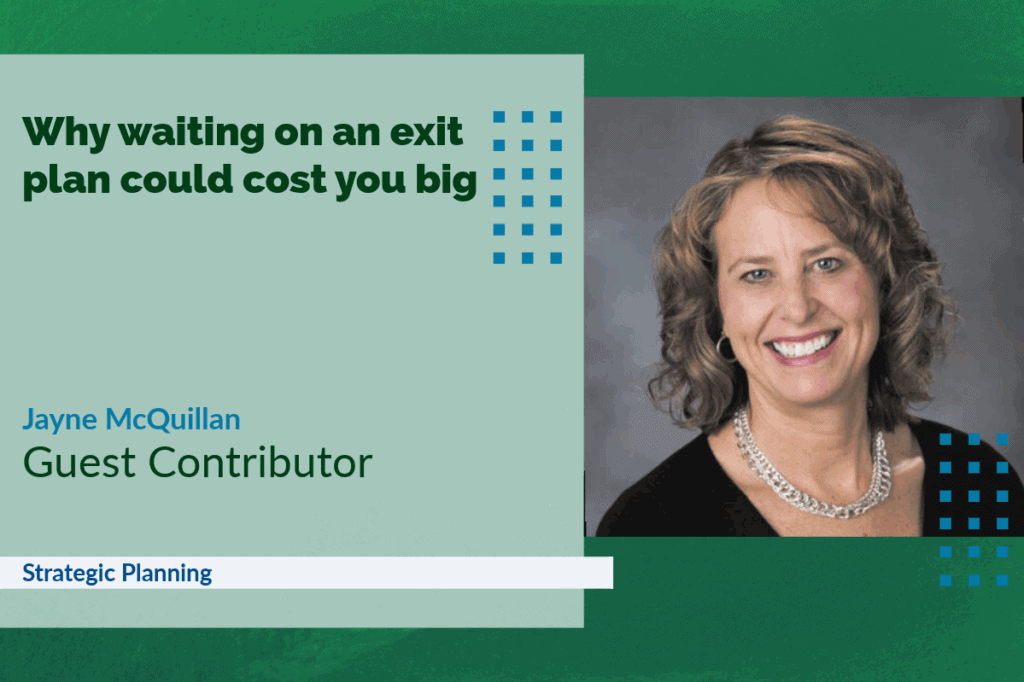
July 14, 2025
While speaking at a recent M&A conference, I was asked by a participant in my breakout session, “What’s YOUR exit plan?”
Talk about being put on the spot.
As someone who helps business owners grow value and prepare for successful exits – personally, financially and operationally – I am no different.
I get caught up in running my business, too.
Like many business owners, I sometimes put my own planning on the back burner.
Building a business that is ready for a future exit is one of the most important things you can do, but it rarely feels urgent.
Have you ever told yourself, “I need to plan for my exit, but I just don’t have time?”
You’re busy handling customers, operations, employee issues – all the fires of the day.
Then one day, it’s too late.
A health issue forces a fast exit
- No successor is ready, and there is no exit plan in place
- Business value drops, a fire sale or closure of the business
- Owner burnout with no backup plan
- You have waited too long, and buyer interest is low
- Less negotiating power and fewer exit options
Incomplete tax or legal planning
- You rush the sale and pay more in taxes
- You lose wealth you could have protected through estate planning strategies
No successor lined up or trained
- Family or team is unprepared, forcing a sale to outsiders
- Sale may be delayed, discounted or cause conflict among stakeholders
Retirement comes sooner than expected
- You are not ready – financially, personally, or operationally
- You work longer or accept a lower retirement lifestyle
Or in the most difficult scenario – an unexpected death – your family is left navigating grief and the stress of handling a business they may not be prepared to run or sell.
Planning ahead can help avoid exit pitfalls
Like many clients, I’ve had my own starts and stops in exit planning, from staffing changes to shifts in my role.
But, I know it is my responsibility to prepare my team, my business and myself for a successful transition.
I want to exit on my terms.
But I don’t have a crystal ball.
Planning now means I’m protecting what I’ve built and preparing my team to succeed, even if something unexpected happens.
I once met a business owner in his 70s who needed $3 million from the sale of his business to retire comfortably.
But the business was only worth $1.5 million.
His choices – keep working to build value or settle for less.
That’s a tough spot to be in, especially when it could have been avoided.
Compare that to another owner we worked with who started planning about two to three years before retirement.
At first, he wasn’t sure it would pay off.
But with guidance and preparation, the business grew 330% in value, and cash flow increased by $1.2 million.
When he goes to market, his ROI in business value creation and exit planning will be more than 5,700%.
That’s the power of starting early.
Why don’t more business owners start early?
Simple answer – because many don’t know that:
- Exit planning is a process – not a one-time event, but a process that should start three to five years before your desired transition
- Waiting limits your choices: buyers, terms, timing
- Value must be built, not assumed; it takes time to de-risk the business, professionalize operations and enhance transferable value
- The best time to plan is before you’re ready, not when you’re forced to
I’m just like the rest of you.
It’s easy to put it off.
But the cost of waiting can be high.
And you’re not the only one it impacts – your employees, family members, vendors and even the community can be affected.
Take the first step toward a successful exit – even one small step can put you on the path to building business value and protecting your legacy.
Planning today can ensure that your life’s work gives you the freedom, payoff and peace of mind you deserve.
 Empty Barrel Distillery: Crafting history in every sip
Empty Barrel Distillery: Crafting history in every sip The art of upholstering done the ‘Knights’ way
The art of upholstering done the ‘Knights’ way







